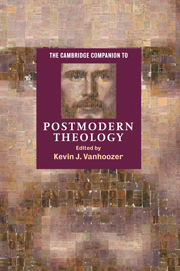Book contents
- Frontmatter
- Part 1 Types of postmodern theology
- 1 Theology and the condition of postmodernity
- 2 Anglo-American postmodernity
- 3 Postliberal theology
- 4 Postmetaphysical theology
- 5 Deconstructive theology
- 6 Reconstructive theology
- 7 Feminist theology
- 8 Radical orthodoxy
- Part 2 Christian doctrine in postmodern perspective
- Index
4 - Postmetaphysical theology
from Part 1 - Types of postmodern theology
Published online by Cambridge University Press: 28 May 2006
- Frontmatter
- Part 1 Types of postmodern theology
- 1 Theology and the condition of postmodernity
- 2 Anglo-American postmodernity
- 3 Postliberal theology
- 4 Postmetaphysical theology
- 5 Deconstructive theology
- 6 Reconstructive theology
- 7 Feminist theology
- 8 Radical orthodoxy
- Part 2 Christian doctrine in postmodern perspective
- Index
Summary
Aiming to be neither “postmodern” nor “premodern” nor indeed “modern,” the “postmetaphysical” theology associated with French thinker Jean-Luc Marion (b. 1946) responds to a Christian God and Father who, as absolute love or charity, and according to that charity’s “essential anachronism,” would remain beyond all historical or cultural determination even while abandoning himself fully to history in the Christ. From such a perspective, Marion’s theology seeks to free the self-revelation of the Christian God from every precondition or determination of human thought and language – and above all from the thought and language of “Being” that have dominated Western metaphysics and its “ontotheological” conception of God as a “supreme being.”
In his critique of metaphysics as “ontotheology,” Marion is indebted primarily to Martin Heidegger (1889–1976), and in an eventual critique of Heidegger himself, Marion will draw on the post-Heideggerian thought of Emmanuel Levinas (1905–1995), but Marion’s core theological vision is shaped most decisively by the “divine-names” theology and “mystical” theology found in the late fifth- or early sixth-century writings of Dionysius the Areopagite (or the “Pseudo-Dionysius”). In the Dionysian appeal to an inconceivable and ineffable “Good beyond Being,” Marion locates an extrametaphysical “God without Being.” The “without” in this theology of “God without Being” does not mean to indicate that God is not or does not exist, but rather that any divine existence or nonexistence that human thought might ever imagine falls infinitely short of the divine generosity that stands at the heart of revelation. The highest name for God, Marion insists, is not to be found in the metaphysical predication of Being or essence but rather in the theological praise of goodness or love, for while finite creatures must first be in order to love, God loves “before Being,” and through that love alone God’s goodness gives all – including the Being of beings itself.
- Type
- Chapter
- Information
- The Cambridge Companion to Postmodern Theology , pp. 58 - 75Publisher: Cambridge University PressPrint publication year: 2003
- 2
- Cited by

